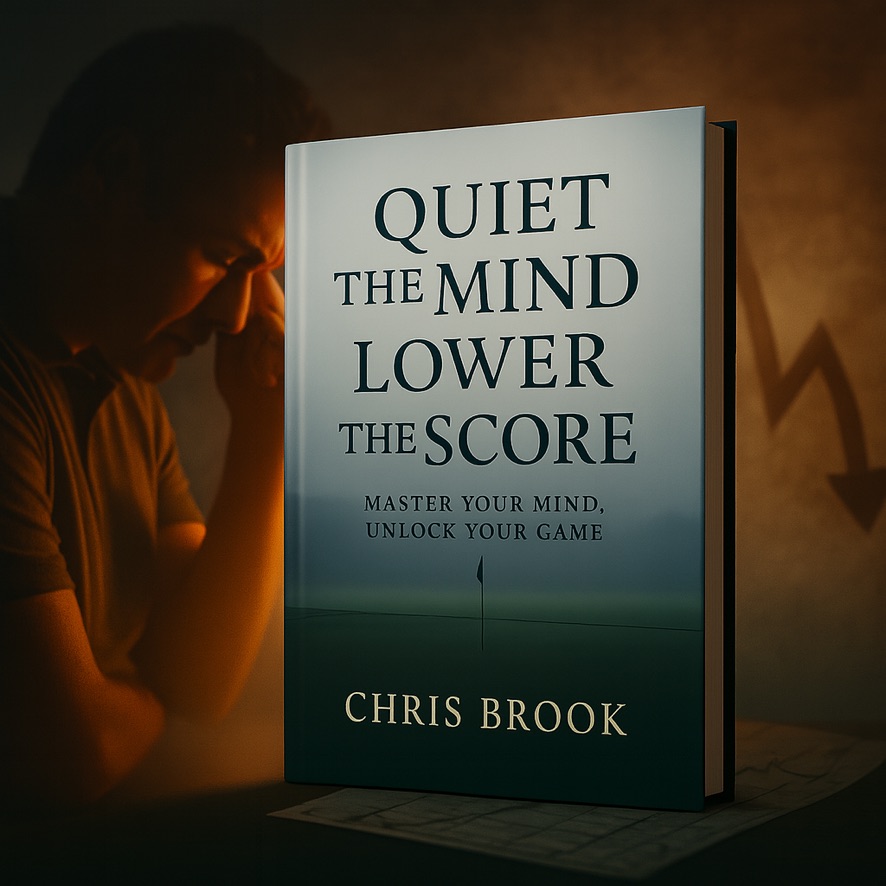Golfers spend countless hours on the driving range, invest in the latest equipment, and analyse their swing from every angle. Yet, even with perfect mechanics, the game can unravel under pressure. Why? Because golf is not only a game of physical skill—it’s a test of mental clarity, emotional control, and focus. This is where Quiet the Mind, Lower the Score by Chris Brook changes everything.

Chris Brook, a world-leading performance psychologist and elite golf coach, brings decades of experience in golf psychology, neuroscience, and performance identity into one groundbreaking resource. Whether you’re a club golfer trying to break 90 or an aspiring tour professional chasing consistency, this book delivers what most training never touches: the system behind your swing.
The Hidden Game Behind the Swing
Most golfers believe that technical perfection is the key to better scores. But the truth is, the mind controls how the body performs under pressure. When nerves, self-doubt, or overthinking take over, even the most reliable swing breaks down. Quiet the Mind, Lower the Score reveals why traditional golf mental training often fails—because it focuses on “positive thinking” rather than rebuilding the underlying mental framework that governs decision-making, composure, and trust.
Brook introduces the concept of Performance Identity—the mental architecture that determines how you respond to pressure, recover from mistakes, and stay present on the course. This isn’t about tricks or quick fixes; it’s about rewiring how you think, feel, and act as a player.
Golf Psychology That Actually Works
Many golf psychology books offer generic advice—breathe deeply, visualise, think positively—but in competitive play, these tools often collapse. Quiet the Mind, Lower the Score takes a different approach. Drawing from neuroscience, elite performance research, and thousands of hours coaching players worldwide, Brook shows golfers how to:
- Master focus in golf by reducing mental noise before and during the shot.
- Play with confidence under pressure without forcing positivity.
- Neutralise performance anxiety in golf by understanding nervous system responses.
- Adapt to adversity instead of chasing control when things go wrong.
- Lower your golf score without obsessing over swing mechanics.
From Frustration to Flow
Golfers at every level know the frustration of hitting it beautifully on the range, only to struggle on the first tee. Brook explains why this happens: the brain defaults to protective patterns when it senses threat or uncertainty. In Quiet the Mind, Lower the Score, you’ll learn how to break this cycle and enter the flow state more consistently—where the game feels effortless, decisions are instinctive, and execution is automatic.
Why Every Golfer Needs This Book
- It’s Based on Science, Not Guesswork – Rooted in neuroscience, sport psychology, and elite-level coaching.
- It Builds a System, Not Just Skills – Creates a repeatable mental process that supports every shot.
- It’s for All Levels – From breaking 100 to competing at tour level.
- It Works Beyond the Course – Improves mental clarity in sport and life.
Practical Tools for Immediate Impact
This is not a “read once and forget” book. It’s a practical training manual for your mind. Inside, you’ll find structured exercises, on-course applications, and post-round reflection methods that help you:
- Identify your personal pressure triggers.
- Develop mental routines that enhance performance.
- Create adaptability to recover quickly from mistakes.
- Understand the psychological patterns that cause your performance to swing up and down.
Where to Get Your Copy
Quiet the Mind, Lower the Score is available now in paperback, hardback, and Kindle editions. For golfers who want the ultimate experience, a limited signed hardback edition is also available exclusively through Chris Brook’s website.
Final Thought
If you’re serious about your game, this is the golf psychology book you can’t afford to miss. It doesn’t just help you play better golf—it transforms how you approach the game itself. Because in golf, as in life, when you quiet the mind, you lower the score.